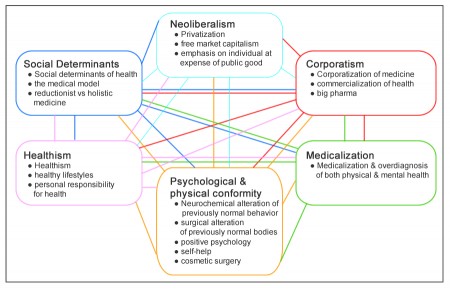Back in May, Evgeny Morozov wrote a review for The New York Times Book Review of two books: The Naked Future: What Happens in a World That Anticipates Your Every Move? by Patrick Tucker and Social Physics: How Good Ideas Spread — The Lessons From a New Science by Alex Pentland. The review is excellent. I’m mostly going to quote from this review (plus one of Morozov’s books), since this is a huge topic in which I have considerable interest but no expertise. I’ve been thinking about a JAMA article I read recently that discusses the need to convince the public to allow extensive use of Big Data in connection with health care (What’s that you bought at the grocery store? You didn’t renew your gym membership?), and Morozov’s ideas seem related. (Morozov, by the way, considers Big Data an “ugly, jargony name.”) Read more
Tag Archives: neoliberalism
For-profit medicine and why the rich don’t have to care about the rest of us
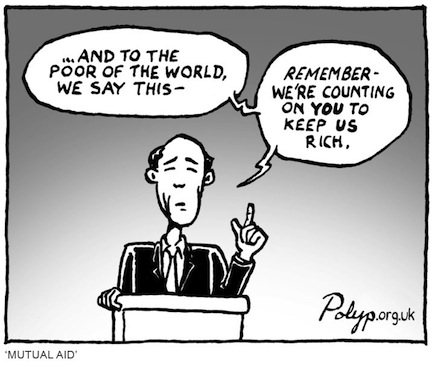 Jill Lepore has an article in a recent New Yorker called The Disruption Machine: What the gospel of innovation gets wrong. Her target is Clayton M. Christensen’s book The Innovator’s Dilemma and, specifically, disruptive innovation. As usual with Lepore, her essay is personable and well-argued. What I liked most about it, though, was its brief discussion of how unfortunate it is that professions such as higher education and medicine are being privatized (if they’re not already) and administered to maximize efficiency, making profits more important than students or patients. (emphasis added) Read more
Jill Lepore has an article in a recent New Yorker called The Disruption Machine: What the gospel of innovation gets wrong. Her target is Clayton M. Christensen’s book The Innovator’s Dilemma and, specifically, disruptive innovation. As usual with Lepore, her essay is personable and well-argued. What I liked most about it, though, was its brief discussion of how unfortunate it is that professions such as higher education and medicine are being privatized (if they’re not already) and administered to maximize efficiency, making profits more important than students or patients. (emphasis added) Read more
Neoliberalism, tobacco, and public health (2)
The occasion for the rambling reflections on neoliberalism in the previous post was three “perspective” articles on tobacco in a recent issue of The New England Journal of Medicine. Two of them concern the FDA’s attempt to place graphic warnings on cigarette packs. The other is on cigarette smoking among the homeless.
The First Amendment
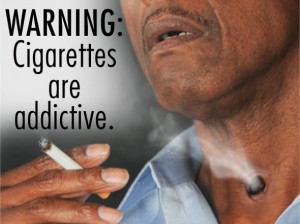 Placing graphic warnings on cigarette packs was part of the 2009 Family Smoking Prevention and Tobacco Control Act. The tobacco industry sued the FDA (R.J. Reynolds Tobacco Co. v. FDA), claiming the warnings violated the industry’s First Amendment rights. In a case decided last year, the tobacco industry won.
Placing graphic warnings on cigarette packs was part of the 2009 Family Smoking Prevention and Tobacco Control Act. The tobacco industry sued the FDA (R.J. Reynolds Tobacco Co. v. FDA), claiming the warnings violated the industry’s First Amendment rights. In a case decided last year, the tobacco industry won.
David Orentlicher, in his article The FDA’s Graphic Tobacco Warnings and the First Amendment, writes that the decision is both surprising and not surprising. It’s not surprising “given the Supreme Court’s increased sympathy toward corporations and their First Amendment rights. Regulations of commercial speech often succumb to judicial scrutiny.” It’s surprising because, while the Supreme Court now restricts the government’s power to regulate corporate speech, it has not in the past interfered with the government’s authority when it comes to regulating matters of public health. Evidently, that’s not the case anymore.
The upshot: (emphasis added)
[C]ompanies today are better able to promote their products, and government is less able to promote health than was the case in the past. Ironically, early protection of commercial speech rested in large part on the need to serve consumers’ welfare. In 1976, for example, the Supreme Court struck down a Virginia law that prevented pharmacists from advertising their prices for prescription drugs. The law especially hurt persons of limited means, who were not able to shop around and therefore might not be able to afford their medicines. Today, by contrast, courts are using the First Amendment to the detriment of consumers’ welfare, by invalidating laws that would protect the public health.
Neoliberalism, tobacco, and public health (1)
This post became much too long, so I’ve divided it into two parts. The first part is mainly about neoliberalism; the second mainly about graphic warnings on cigarette packs (plus smoking among the homeless). When I read, in a recent NEJM article, “The Supreme Court’s increasing sympathy for corporate speech and decreasing deference to public health authorities makes it more difficult for government to protect the public’s health,” my first thought was: What a perfect example of neoliberalism in action.
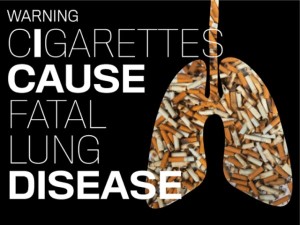 No one would claim that neoliberalism strives for consistency when implementing its ideals. For example, neoliberalism blames individuals for the health consequences of cigarette smoking (“I cause disease”) and at the same time opposes legislation to reduce cigarette consumption (graphic warnings on cigarette packs). When there is a choice to be made, the deciding factor for neoliberalism will be the efficiency with which wealth can be upwardly redistributed.
No one would claim that neoliberalism strives for consistency when implementing its ideals. For example, neoliberalism blames individuals for the health consequences of cigarette smoking (“I cause disease”) and at the same time opposes legislation to reduce cigarette consumption (graphic warnings on cigarette packs). When there is a choice to be made, the deciding factor for neoliberalism will be the efficiency with which wealth can be upwardly redistributed.
Personal responsibility
Personal responsibility — including personal responsibility for health — is a fundamental principle of neoliberalism. David Harvey writes on this in the context of neoliberalism and labor: (emphasis added in this and subsequent quotations from Harvey)
[L]abour control and maintenance of a high rate of labour exploitation have been central to neoliberalization all along. The restoration or formation of [elite] class power occurs, as always, at the expense of labour.
It is precisely in such a context of diminished personal resources derived from the job market that the neoliberal determination to transfer all responsibility for well-being back to the individual has doubly deleterious effects. As the state withdraws from welfare provision and diminishes its role in arenas such as health care, public education, and social services, which were once so fundamental to embedded liberalism, it leaves larger and larger segments of the population exposed to impoverishment. The social safety net is reduced to a bare minimum in favour of a system that emphasizes personal responsibility. Personal failure is generally attributed to personal failings, and the victim is all too often blamed.
Personal responsibility for health — fundamental to healthism (a frequent topic on this blog) — serves the interests of neoliberalism in a number of ways. It can be used to justify reduced spending on health care and social services by the state. This is desirable in itself, according to neoliberals, but it also increases consumer spending on health care, which in turn benefits the health care, pharmaceutical, and insurance industries. Read more
Healthy lifestyles: The unfortunate consequences
 Continued from the previous post, where I discussed the expansion of universal health care prior to the 1970s, how this created a growing demand for health care, and the problem health care costs posed for governments, especially when the economy suffered a downturn in the seventies. One response to the situation was to consider new ideas. Rather than limit strategies to what could be done by the health care industry, why not directly address the underlying causes of disease by considering social determinants of health.
Continued from the previous post, where I discussed the expansion of universal health care prior to the 1970s, how this created a growing demand for health care, and the problem health care costs posed for governments, especially when the economy suffered a downturn in the seventies. One response to the situation was to consider new ideas. Rather than limit strategies to what could be done by the health care industry, why not directly address the underlying causes of disease by considering social determinants of health.
Canada’s Lalonde report
In 1974, Canada produced the Lalonde report. It has been described as
[the] first modern government document in the Western world to acknowledge that our emphasis upon a biomedical health care system is wrong, and that we need to look beyond the traditional health care (sick care) system if we wish to improve the health of the public.
The US Congress emulated this thinking in 1976 by creating the Office of Prevention and Health Promotion. The US Department of Health, Education, and Welfare began publishing the document Healthy People: The Surgeon General’s Report on Health Promotion and Disease Prevention in 1979. The response in European countries — caught in the same bind of greater demand, increasing costs, and the financial consequences of a deteriorating economic landscape – was similar.
The common thread in these new perspectives on health was the assertion that health could be improved — without increasing health care costs — if we concentrated on such things as the work environment (occupational health), the physical environment (air and water pollution, pesticides and other carcinogens in food), genetics, and healthy lifestyles. The approach was broad: the environment was considered at least as important as the promotion of healthy lifestyles. Read more
Healthy lifestyles: The antecedents
 In the 1970s, public health policies began to promote the idea that individuals are responsible for their health and therefore have an obligation to adopt healthy lifestyles. Over the ensuing decades, health became both an extremely popular topic for media coverage and a lucrative market for vendors of health-related products and services. What followed was a substantial increase in health consciousness and greater anxiety about all things that concern the body.
In the 1970s, public health policies began to promote the idea that individuals are responsible for their health and therefore have an obligation to adopt healthy lifestyles. Over the ensuing decades, health became both an extremely popular topic for media coverage and a lucrative market for vendors of health-related products and services. What followed was a substantial increase in health consciousness and greater anxiety about all things that concern the body.
Do healthy lifestyles actually produce better health? That they should may seem like common sense, which is one reason it’s been so easy to promote the idea that they do. The question is difficult to answer with absolute certainty, however. For one thing, the behavior that counts towards a healthy lifestyle does not readily lend itself to the objective measurements required for reliable scientific evidence. Defining health is also tricky. Lifespan is often used to compare the ‘health’ of different nations, but this fails to capture the subjective sense of health that is meaningful to individuals. Perhaps most important, while in theory a healthy lifestyle might improve health, that does little good if – as is now obvious – it’s extremely difficult to maintain behaviors that require things like changing what we eat and how often we exercise.
A related question would be: Did the promotion of healthy lifestyles reduce health care costs? This too seems like a sensible assumption, and the assertion is quite popular, especially among politicians. Health care costs have increased to hand-wringing levels. Promoting healthy lifestyles costs governments next to nothing, while the cost of health care is all too easily quantified. Read more
A more equitable future? US reveals its true intentions
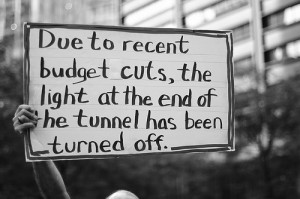 Why is it so hard to convince policy makers worldwide to address the social determinants of health, including poverty, hunger, and income inequality? Judging by the excerpt below, we shouldn’t count on the US to champion this cause any time soon. It’s from a document called “The Future We Want,” issued by the Rio+20 conference last June. The US requested changes to the document, indicated in bold (additions) and strike-outs (deletions).
Why is it so hard to convince policy makers worldwide to address the social determinants of health, including poverty, hunger, and income inequality? Judging by the excerpt below, we shouldn’t count on the US to champion this cause any time soon. It’s from a document called “The Future We Want,” issued by the Rio+20 conference last June. The US requested changes to the document, indicated in bold (additions) and strike-outs (deletions).
Eradicating poverty is the greatest global challenge facing the world today and an indispensable requirement for sustainable development. In this regard we are committed to free humanity from extreme poverty and hunger as a matter of urgency.
We recognize that promoting
universalaccess to social services can make an important contribution to consolidating and achieving development gains.We strongly encourage initiatives
at all levelsaimed atprovidingenhancing social protection for all people. Read more
On healthism, the social determinants of health, conformity, & embracing the abnormal: (4) The abnormal part
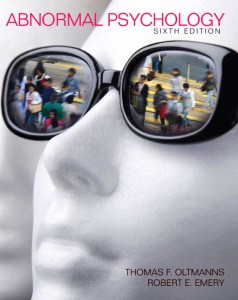 Continued from parts one, two, and three.
Continued from parts one, two, and three.
A year ago, when I decided to call my declining rate of blogging a ‘sabbatical,’ I wrote down some questions to explore while I took time off to read.
How did we find our way into the dissatisfactions of the present – the commercialization of medicine, the corporatization of health care, the commodification of health? Does understanding the path we followed offer any insight into finding a better direction? Was the increasingly impersonal nature of the doctor-patient relationship inevitable once medicine became a science? Or was it only inevitable once health care emphasized profits over patients and the common good?
At the time I thought I would read primarily in the history of medicine, and that was how I started. Appreciating the historical context of medicine is important for understanding both how medicine ended up where it is today and what medicine could become. “The texture and context of the medical past provide perspective, allowing us to formulate questions about what we can realistically and ideally expect from medicine in our own time,” I wrote.
Now that I’ve become more familiar with the social determinants of health, I’m less optimistic about the future. The problem is not simply that the corporatization of health care has increased dissatisfaction among both doctors and patients. The problem is that our focus is so narrowly limited to health care systems that we fail to see the larger issue. As one metaphor puts it, doctors are so busy pulling diseased patients out of the river, there’s no time to look upstream and ask who’s throwing the bodies into the water. Read more
On healthism, the social determinants of health, conformity, & embracing the abnormal: (3) Connections
Continued from parts one and two, where I defined the terms used in the following diagram of my blogging interests. Click on the graphic for a larger image.
If I had written the previous two posts a year ago, I would have realized how much my interests were intertwined. I guess I wasn’t ready to do that. Anyway, in this post I catalog some of the connections.
Healthism
~ Healthism and psychological and physical conformity: Healthy lifestyle campaigns promote an ideal way of life that encourages individuals to alter their behavior and appearance. Although it’s true that we would all be better off if we didn’t smoke, that doesn’t make anti-smoking laws any less authoritarian, i.e., requiring conformity (see the section on anti-authority healthism in this post). The fitness aspect of healthy lifestyles promotes the desirability for both men and women of acquiring (i.e., conforming to) specific body images.
“Self-help is the psychiatric equivalent of healthism.” That’s a slogan I made up. I’m not sure yet if it will stand up to scrutiny. Certainly the self-help industry encourages self-criticism, which leads to a preoccupation with those aspects of personality currently considered undesirable. Read more
On healthism, the social determinants of health, conformity, & embracing the abnormal: (2) Economics & the socio-political
Continued from part one, where I discussed the first three of my six interests: healthism, medicalization, and psychological and physical conformity. Click on the graphic below to see a larger image.
The social determinants of health
Social determinants of health (often abbreviated SDOH) refers to unequally distributed social and economic conditions that correlate with unequal and inequitable distributions of health and disease. Presumably there is a causal relationship between the two, not merely a correlation. Definitively identifying the causal mechanisms, however, is difficult. A great many things influence our health (including things we’re not even aware of yet), and it can be difficult to isolate and scientifically study some of the ones we strongly suspect, like poverty, isolation, or a sense of being socially inferior.
The medical model is the preferred framework in modern westernized societies for explaining the distribution of health and disease. It emphasizes risk behavior (smoking, diet), clinical risk factors (blood pressure, blood sugar, cholesterol levels), genetics, health care access and quality, behavioral change, and patient education. One common characteristic of the medical model’s explanation of health and disease is that causes are located in the individual (behavior, genes), not in the individual’s economic and social environment. Read more
On healthism, the social determinants of health, conformity, & embracing the abnormal: (1) Bodies, minds & medicine
It’s always hard to be sure about these things, but I think the reason I decided to take a ‘sabbatical’ from blogging last July was that I was interested in too many seemingly unrelated topics. Writing about all of them left me feeling like I never got to the ‘meat’ of any one of them. And I couldn’t convince myself to focus on just one or two things, since that would mean abandoning the others, which I was unwilling to do.
Now that I’ve taken the past year to read and reflect, I find – duh! – that my interests are not as unrelated as I’d assumed. In hindsight, I should have realized this long ago, but, alas, I did not. I’m writing this post to clarify to myself what I now see as the common threads that connect my interests.
Here is a diagram that groups my interests into six categories. (Click on the graphic to see a larger image.)
Four of the six categories relate to all five of the others. The two outliers (neoliberalism and medicalization) are not as directly related as I feel the others are. Read more
Recommended (online) reading
 I’m still on “sabbatical.” Mostly reading. Thinking about what I most want to write about. I know what my interests are — the problem is, I have too many. Meanwhile, here are some blogs I enjoy reading.
I’m still on “sabbatical.” Mostly reading. Thinking about what I most want to write about. I know what my interests are — the problem is, I have too many. Meanwhile, here are some blogs I enjoy reading.
Thought Broadcast by Dr. Steve Balt
Psychiatry is a controversial topic these days. We (speaking for myself, anyway) love to criticize the overprescription of psychopharmaceuticals, the medicalization of the slightest deviation from “normal,” and those psychiatrists who are eager to take “gifts” from the drug companies whose products they subsequently prescribe and promote.
I suspect people relate to psychiatry more readily than to the science of medicine. We’ve all known moments of slippage along the spectrum of mental health. We’d all like to understand ourselves better, something psychiatry used to promise before it tried to reduce us to the chemical interactions inside our brains.
Dr. Balt writes about all of this. What I especially like about his blog is his compassion for patients and his honest assessment of the psychiatric profession. His writing has a quality like Gawande’s: He maintains a strong personal presence without straying too far into the overtly personal.
To get a sense of Thought Broadcast, read Dr. Balt’s My Philosophy page. A recent post I’d recommend: How to Retire at Age 27. It’s on psychiatric qualification for disability. His point is that labeling (and medicating) someone as disabled does nothing to solve underlying social problems. It concludes:
Psychiatry should not be a tool for social justice. … Using psychiatric labels to help patients obtain taxpayers’ money, unless absolutely necessary and legitimate, is wasteful and dishonest. More importantly, it harms the very souls we have pledged an oath to protect.
Why are we so willing to undergo cosmetic surgery?

The high rate of cosmetic surgery in Asia has been widely discussed, including an article in The New York Times. What caught my attention in this more recent piece was the postmodern/feminist spin.
Susan Feiner, a feminist economist, offers these comments: (emphasis added)
Parents are caught between a traditional world view and a postmodernist world view. On the traditional side especially, your daughter is your property and potential to social advancement. … On the postmodern side you have this idea that western beauty, this imported beauty ideal, is really a sign of your family’s openness to the future. So those two impulses – a very traditional impulse and the more modern neo-liberalism impulse come together at the moment of submitting your own daughter to the knife. …
On one hand we have all of this acceptance and even approval for women to become doctors and lawyers and political leaders and at the same time what’s been held up to women is this Walt Disney notion of our lives. That really even if you are a doctor or a lawyer or a political leader the best you can really do is to be beautiful and get some wealthy rich man to take care of you, so the best possible outcome for any women is to be both hugely successful professionally and be knock-down beautiful.
Why so much willingness to reshape the body?
What drives the popularity of cosmetic surgery? As bioethicist Carl Elliott notes in one of my favorite books, Better Than Well, medical enhancements, along with body size, are part of the logic of consumer culture: “You cannot simply opt out of the system and expect nobody to notice how much you weigh.” Read more
Sex, lies, and pharmaceuticals
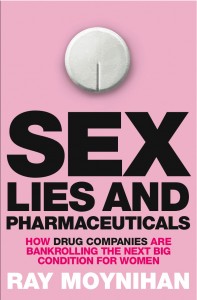 Just a quick word in reply to a review of Ray Moynihan’s Sex, Lies, and Pharmaceuticals: How Drug Companies Plan to Profit from Female Sexual Dysfunction
Just a quick word in reply to a review of Ray Moynihan’s Sex, Lies, and Pharmaceuticals: How Drug Companies Plan to Profit from Female Sexual Dysfunction (co-authored by Barbara Mintzes).
First, the reviewer, British sociologist Linsey McGoey, criticizes the book for continuing its attack on the medicalization of life.
A few pages in, it’s hard not to feel déjà vu. Moynihan came out a few years ago with Selling Sickness
, a book tackling the problem of medicalization, the tendency for typical life phases or human behaviour such as shyness to be medicalized – treated as disorders and diseases requiring medical treatment.
IMHO, there can never be enough books educating the public about medicalization.
Next she defends the pharmaceutical industry:
They [the authors] want to condemn [the pharmaceutical] industry for preying on human insecurity and profiting from the oldest adage in the book: Sex sells. The problem is, just as Viagra has been embraced by millions, its pink equivalent would be a sure seller – and not because consumers are dupes, or because industry is inherently malevolent, or because doctors are in the pockets of companies. Sure, some are, but such a thesis always oversimplifies the links between human disease and human desire. Most of them [sic] time, people want to be told that a problem is medical in orientation. It helps to exonerate a sense of personal blame.
Eliminating a sense of blame or shame is exactly the tactic pharmaceutical marketing employs. (See How the pharmas make us sick.) Viagra has been embraced by millions because ED has been medicalized! I was just reading about a “renegade” Canadian doctor who’s quoted on the subject: Read more
Feeling sorry for plastic surgeons
 For her new book, American Plastic: Boob Jobs, Credit Cards, and the Quest for Perfection
For her new book, American Plastic: Boob Jobs, Credit Cards, and the Quest for Perfection, Laurie Essig spent time interviewing plastic surgeons. She was interviewed herself on Salon, where she was asked what else surprised her — besides statistics like 85% of cosmetic surgery is purchased on credit and over 70% of patients earn less than $60,000 a year. (emphasis added)
One of the things that surprised me is how out of control the cosmetic surgeons themselves felt in all this. I felt a lot of sympathy for the cosmetic surgeons, even when they were telling me that I needed a facelift. Cosmetic surgeons are primarily men, well over 90 percent. They’d gone to medical school and they came out with huge amounts of debt themselves, often well over $200,000. They meant to be reconstructive surgeons, they meant to fix people after horrific accidents or cancer, and they started doing some boob jobs on the side and it started to eat up more and more of their practice because it was so lucrative. They want to send their kids to nice schools, they have mortgages, they have family, and you could see that they felt a little bit helpless as well. It wasn’t what they meant to do.
They seemed just as much products of the system as the middle-aged women going in for a facelift or boob job. They were hoping for a better future. Of course, they create the desire — they advertise, people come into their office and they tell them what they need — but I think that if they hadn’t graduated from school with so much debt, most of them would be selling cosmetic procedures a lot less than they are.
A compassionate view and undoubtedly true. For a similar and depressing take on the financial dilemma of primary care physicians, see the comments following my post on KevinMD, Marcus Welby and the relentless growth of specialization. Read more
Misc Links 1/17/11
 Rates of Suicidal Ideation Among US Surgeons ‘Very Concerning’ (Medscape Today)
Rates of Suicidal Ideation Among US Surgeons ‘Very Concerning’ (Medscape Today)
1 in 16 (6%) had suicidal thoughts, but very few sought help. Rate substantially higher than general population in surgeons age 45 to 54. Study cites burnout, recent major medical error as risk factors.
British Researcher Wakefield Defends Link Between Vaccine and Autism (ABC News)
What’s interesting here is the second video that comes up, where Wakefield defends himself and accuses Brian Deer – the journalist who accuses him of fraud for financial gain — of using “selective information”
GOP wants repeal, but fervor slips in poll (Seattle Times)
Strong opposition to health care now at 30%, lowest level since September 2009. Only 25% want repeal. Opposition among Republicans drops below 50%. Republican lawmakers have not united around an alternative plan.
Democrats Seek Right Message To Boost Health Law (NPR)
Linguistics professor George Lakoff: The Republicans have a moral message (freedom) while Democrats are talking policy details Read more
Income inequality and American politics
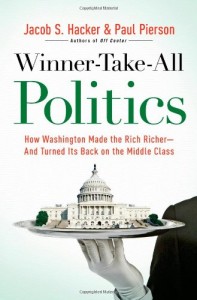 I had looked forward to reading Winner-Take-All Politics: How Washington Made the Rich Richer–and Turned Its Back on the Middle Class
I had looked forward to reading Winner-Take-All Politics: How Washington Made the Rich Richer–and Turned Its Back on the Middle Class. The authors are political scientists Paul Pierson and Jacob S. Hacker.
On the whole it was less trenchant than I had hoped it would be. It does, however, thoroughly document one very good point: US income inequality is not — or not simply – due to the economic consequences of globalization, like the shift from manufacturing jobs to service sector jobs, with the ensuing loss of pay and benefits. It’s also due to what’s happened in American politics. Business interests — represented by Republicans — have been much better at organizing themselves than have labor unions and interest groups that represent the middle class. And the cost of campaigning – which increased enormously once TV became the dominant campaign medium – has made Democrats willing to support legislation that favors the interests of those with money to spare. Read more
Healthy lifestyles serve political interests
 The practice of western medicine remained virtually unchanged from the time of the ancient Greeks to the mid-19th century. This is a testament to medicine’s basically conservative nature: Let’s not risk human life with something brand new.
The practice of western medicine remained virtually unchanged from the time of the ancient Greeks to the mid-19th century. This is a testament to medicine’s basically conservative nature: Let’s not risk human life with something brand new.
Dramatic changes occurred, however, once medicine became a science. By the mid-20th century, medicine was experiencing a Golden Age: Life-saving drugs, miraculous medical breakthroughs, new diagnostic technologies, and a profession held in high public regard.
By the 1970s the Golden Age had ended. Medicine, along with other professions and institutions, fell victim to the anti-establishment sentiments of the 1960s. It was criticized harshly by consumers, journalists, and scholars. Medicine — it was alleged — was no longer concerned with the needs of patients, but with the ambitions of doctors.
The advent of Medicare and Medicaid in the 1960s not only brought government into the health care equation. The American Medical Association’s strenuous opposition to this legislation led the public to associate doctors with small businessmen — avaricious and probably dishonest. The practice of medicine changed from a healing relationship between doctor and patient to a profit-driven business enterprise. Read more
The politics behind personal responsibility for health
 Consumers of cell phones – actually, consumers of any product or service that isn’t essential for health or survival — clearly benefit from the competitive, market-driven economies of today’s modern world.
Consumers of cell phones – actually, consumers of any product or service that isn’t essential for health or survival — clearly benefit from the competitive, market-driven economies of today’s modern world.
There are certain goods and services, however, that are essential for the public’s welfare: Drinking water, city sewage systems, financial support in old age, and the administration of things like prisons, schools, and health care. These “public goods” benefit from government influence. That’s because the profit motive needs some restraint in matters essential for basic survival. (Schools are not technically essential, but they’re important for a successful, prosperous society.)
This is only my opinion, of course. Conservatives, libertarians, free market fundamentalists, and members of the Tea Party would disagree vigorously.
Privatization
Privatization is the transfer of responsibility for public interests to the private sector. The PR argument for privatization is that the private sector is more efficient than government. The more basic, underlying motive, however, is that privatization has great potential for private profits. (See my recent post on the privatization of water as the investment opportunity of a lifetime.)
The downside of privatizing public services is that corporations are answerable only to their shareholders, not to the public they serve. We saw this quite clearly during the health care debate, as the dirty linen of the health insurance industry was aired in Congress. Read more
Water privatization: An investment bonanza
 In May 2000, Fortune magazine published an article on the financial benefits — benefits for corporations and investors, that is — of privatized water. (emphasis added)
In May 2000, Fortune magazine published an article on the financial benefits — benefits for corporations and investors, that is — of privatized water. (emphasis added)
From Buenos Aires to Atlanta to Jakarta, the liquid everybody needs–and will need a lot more of in the future — is going private, creating one of the world’s great business opportunities. The dollars at stake are huge. Supplying water to people and companies is a $400-billion-a-year industry. That’s 40% of the size of the oil sector and one-third larger than global pharmaceuticals. And this is just the beginning. The World Bank estimates that one billion people, one-sixth of humanity, have poor access to clean drinking water, and three billion lack sanitary sewage facilities. Unless governments begin spending much more, the number of people without clean water will rise to 2.5 billion, about one person in three, by the year 2025. …
Water promises to be to the 21st century what oil was to the 20th century: the precious commodity that determines the wealth of nations. … Elizabeth Mackay, chief investment strategist at New York investment house Bear Stearns, calls water “the best sector for the next century.” …
So far [the French company] Suez has had a leg up on its rivals because it understands what’s really needed to turn plain water into big money. … “Where else can you find a business that’s totally international, where the prices and volumes, unlike steel, rarely go down?” he [CEO of Suez, Gerard Mestrallet] argues. …
Here’s how deals work in the developing world. … To turn a profit, it [Suez] must collect far more in water charges than it pays out in salaries, equipment, and interest.
Merchants of Doubt
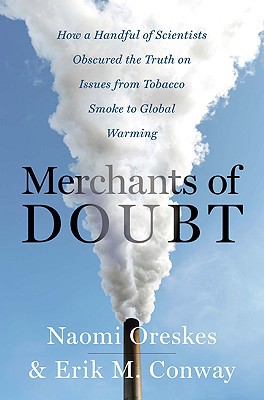 It’s easy to understand – if not condone – the behavior of politicians who are financed by tobacco and oil companies. They oppose the regulation of smoking or pollution because they benefit from the financial contributions of those industries.
It’s easy to understand – if not condone – the behavior of politicians who are financed by tobacco and oil companies. They oppose the regulation of smoking or pollution because they benefit from the financial contributions of those industries.
But what motivates certain scientists to relentlessly cast doubt on peer-reviewed scientific evidence that’s inconveniently contrary to financial interests? A new book, Merchants of Doubt by Naomi Oreskes and Erik M. Conway, attempts to answer this question.
To some extent, the motivation for certain scientists is the same as that of politicians. Those who opposed the issues covered by this book – nuclear winter (could we survive a nuclear war), Star Wars, acid rain, the ozone hole, global warming, DDT, cigarette smoking and second-hand smoke – are frequently members of “institutes” or think tanks heavily funded by tobacco and “dirty” energy donations.
The answer is much more complex than money, however. And much more interesting. Read more
Déjà vu: Historical resistance to the inequities of health
 If statistical analysis shows conclusively that morbidity and mortality are directly related to income, what should a (presumably) enlightened government do with this information? One approach, consistently popular throughout history, is to blame the victims.
If statistical analysis shows conclusively that morbidity and mortality are directly related to income, what should a (presumably) enlightened government do with this information? One approach, consistently popular throughout history, is to blame the victims.
In the Reagan/Thatcher years we saw an enthusiastic promotion of taking personal responsibility for one’s health. Personal responsibility follows naturally from a neoliberal agenda: Deregulation, privatization, a free market economy. Neoliberalism champions the autonomous individual, whose responsible or irresponsible behavior relieves the state of any responsibility.
This theme is vigorously echoed today by Sarah Palin. You can even buy her “personal responsibility” bumper stickers, mugs, and t-shirts to promote the cause.
Personal responsibility is the conservative answer to public ownership of the structural inequities in society. As a political position, it has deep roots. Just as health inequalities are timeless, so is resistance to improving the health and welfare of the poor.
Why did we shoot ourselves in the foot on health care?

Source: The University of Minnesota
Unlike the US, where a turkey dinner is traditionally associated with Thanksgiving, the United Kingdom dines on turkey at Christmas. So when the British or Australians accuse you of acting like “a turkey voting for Christmas,” they mean you’re going against your own best interests.
The BBC has a new radio series that addresses the question: Why turkeys vote for Christmas. David Runciman writes the first installment, in which he asks: Why is it Americans who would benefit the most from health care reform are the most opposed? One third of Texas residents have no health insurance, for example, but 87% oppose reform.
There are many opinions on why Obama’s reform didn’t pass, and pundits will be arguing this issue for months, if not more. Texans, for example, are likely to oppose government involvement in any aspect of their lives, and that opposition can easily outweigh the value they place on health insurance.



